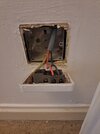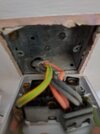John i think i mostly agree with you, to a point. My initial point was that anyone selling or anyone buying some substantial second hand iten such as a car or a house should be of the mindset that its not new and some parts will need replacing or repairing at intervals.
Quite so. To summarise, I think there are two main issues:
- What is 'known' at the time the asking price is decided. If one knows/suspects that some work is required immediately, or is very likely to be needed in the very near future, then that should be taken into account when setting the ('as is') asking price. However, as you say, I don't think that applies to 'work that may be needed at some (unknown) time in the future' - that is taken into account when establishing the asking price for a car/house/whatever 'of a certain age'. Only if major things which were 'unknown' when the price was set show their faces (before sale is completed do I think that one should consider a consequential reduction in asking price.
- I personally doubt that much, if any, consideration should be given to the replacement (if even imminently needed) of limited-life items (exhausts, batteries, brake pads etc.), since I regard them as (expected) 'running costs.
With the example i made, if buying that car with a new exhaust i would not expect to pay more except i might take the view - ok but it needed doing anyway so i will pay a small addition to your additional asking price but nowhere neare the full price, say perhaps 20% or some such.
It depends how one looks at it and, I (as the seller) would probably avoid getting into that situation. I am presuming that when I set the asking price the exhaust was not already in need of immediate replacement. I would therefore point out that when I set the asking price, we (both seller and buyer) knew that, oldish exhausts being oldish exhausts, it could spring a leak "at any time", and that would essentially be just as likely to happen before the sale was completed than after. Hence, I would suggest that the asking price should remain unchanged, even though the exhaust 'now' needs immediate replacement.
In financial terms, that would be the same as what happened, and you disagree with - since, rather than the selling having the work done and adding 100% of the cost onto the price of the car, the buyer would still be paying the original asking price, but then would have to pay 100% of the cost of the work.
In practice, I, as seller, would probably offer a small reduction in price in that situation, but nothing like the 80% (of cost of work) that you suggest.
So back to houses and wiring, if its not been updated for a few years then one would expect some might well need to be done. Pretty much expected. Not ho dear it needs some work doing so drop the price or its recently been done s9 increase the price. Its up to the buyer to look at the overall state of the house, might or might not pay a surveyor just for value purposes, might or might not ask a tradesmen or two to give it a once over or might even organise an EICR but unless it reveals more exceptionally bad than might be otherwise thought it should not really vary the price. Any haggling by either the buyer or the seller should have taken place long before.
All agreed, but with the caveat mentioned above. The asking price (for an 'as is' sale) will have been set on the basis of what was known at the time. If ,for example, a survey revealed something major (e.g. the need to replacee a roof) which had not been known when the price was set, then it clearly would probably be appropriate to negotiate a figure lower than the original asking price.
I once did a small job for a lady and she told me she had "sold" the house (almost) but then at the last minute she decided she wanted "a bit more for it, not a lot, just a bit" the potential buyers pulled out - i imagined they had gone some time and probably some expense and at a late stage she decided to up the price and it cheesed them off.
I've been there, as a buyer - with my first attempt to buy my previous house, we got to within hours of when contracts were due to be exchanged (by which time we'd paid for surveys etc.) when the seller 'pulled out'. Strangely, they didn't ask us to pay more, simply withdrew the property from the market and put it back on the market a few weeks later for an appreciably higher figure. Fortunately, we had a unusually decent solicitor, who (when we found an alternative property to buy), eventually charged us just the agreed price for "one conveyancing", rather than two.
I think that happened because it was at a time (late 70s) when property prices were increasing 'every day'. The house we eventually bought (in late 70s) cost about £15k, and when we sold it almost exactly 10 years later, we got a bit over £100k !
Kind Regards, John




